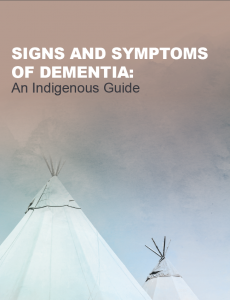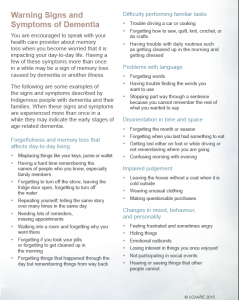Fact sheet from the Indigenous Cognition & Aging Awareness Research Exchange (I-CAARE.ca) in Canada based on research with Canadian indigenous communities.
Each factsheet has a blank space to add your own organization’s contact information. Factsheets have pages in multiples of four so they can be printed on regular paper or as a booklet.
Signs and Symptoms of Dementia: An Indigenous Guide
Fact Sheet Excerpt
Symptoms of dementia may begin in people as young as 45-50 or may begin much later depending on the type of dementia. Recent studies suggest that dementia may occur as much as 10 years earlier in Indigenous people compared to non-Indigenous people in Canada.

Research with Indigenous people in Canada suggests that age-related dementias are not being diagnosed early enough for loved ones and families to benefit from local care and supports.
Some Indigenous people may be reluctant to discuss forgetfulness or memory loss with health care providers for many reasons, for example:
• They consider it to be a normal part of aging and not problematic
• They have not had good experiences with health care providers in the past
• They do not think a diagnosis would make any difference
• They are embarrassed and do not want others to know about their symptoms
• They do not want to take the memory tests
• They have difficulty accessing health care services
When is forgetfulness a part of normal aging versus a symptom of Illness?
Forgetting can be a normal part of getting older. We may forget to pay a bill, lose things and find it hard to remember the words we want to use every once and a while. It can be normal for our memories of events to be less detailed than they once were, we may take a little bit longer to remember. Sometimes we may have words on the tips of our tongues that we cannot find in the moment.
When these types of forgetting become worse over time or begin to happen more often, it may be a sign that something is wrong. For example, missing one bill payment once in a while may be normal, but missing many payments and not being able to manage money may not be normal. Losing track of the day may be normal, but losing track of the month or season is not. Difficulty finding the words we want may sometimes be normal, but not being able to carry on a conversation is not.
Warning Signs and Symptoms of Dementia

You are encouraged to speak with your health care provider about memory loss when you become worried that it is impacting your day-to-day life. Having a few of these symptoms more than once in a while may be a sign of memory loss caused by dementia or another illness.
The following are some examples of the signs and symptoms described by Indigenous people with dementia and their families. When these signs and symptoms are experienced more than once in a while they may indicate the early stages of age-related dementia.
